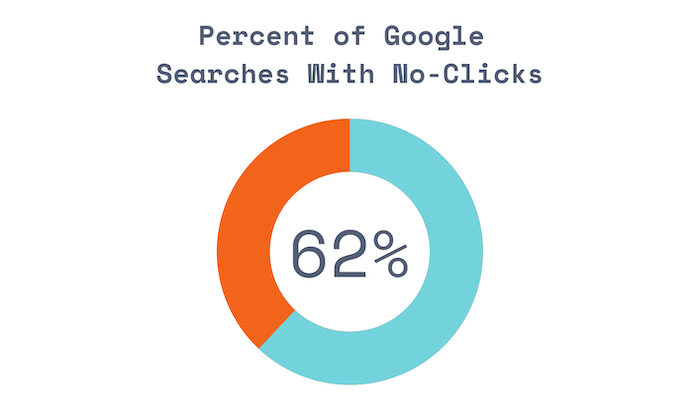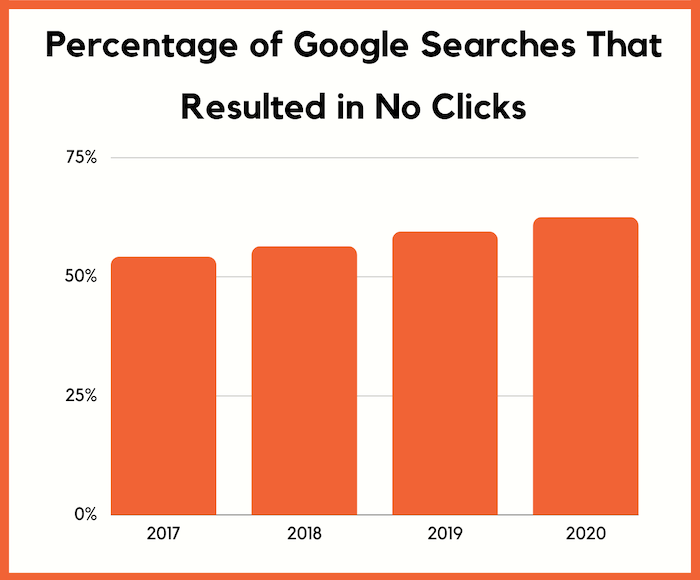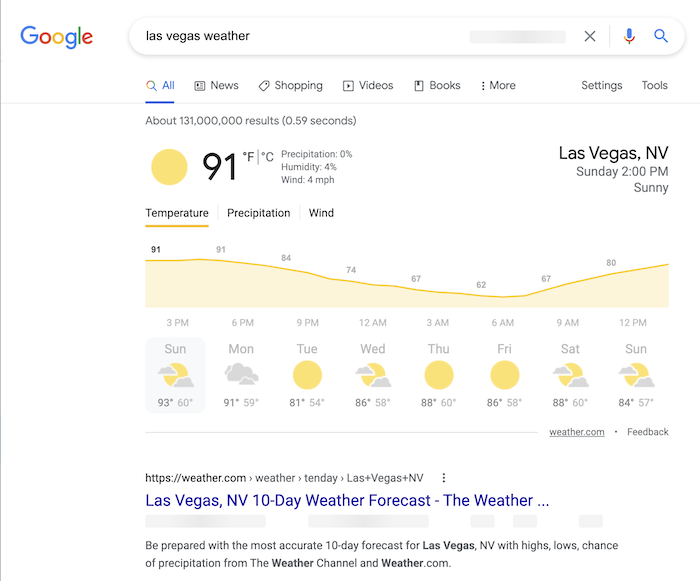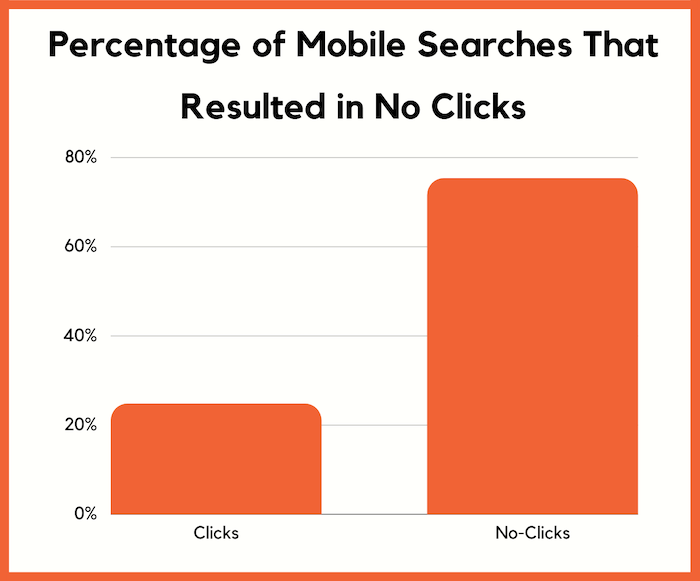
SEO is all about ranking high on Google.
The higher your rank the more clicks you get to your website.
But what if Google starts sending fewer clicks to websites over time, what should you do?
Well, just look at the graph below. It breaks down the last 4 years of click on Google.

According to data that we pulled from Ubersuggest, 62.41% of all searches globally get 0 clicks.
Literally 0 clicks.
But here’s where it gets interesting…
Expect fewer clicks over time
Over time the number of people that clicked on no result has increased. It went from 54.11% in 2017 to 62.41% in 2020.
Now keep in mind we don’t have data on every single Google search, as only Google would have that.
But we buy data from a few different providers and we have data on hundreds of millions of searches each year. So directionally the data is accurate.
Here’s where it gets interesting. According to Comscore 50% of the searches are voice search.
The data providers we get our Ubersuggest data from don’t have access to voice search data yet. So, you can assume the number of “no clicks” is actually greater than what’s presented above.
None-the-less you should expect it to get worse over time as the graph is showing.
Now, why is this? Well, it’s because Google is answering your questions for you when you search.
For example, if you type in, “Las Vegas weather”, you’ll see a listing like this:

Google’s pulling the data from weather.com, but there really isn’t a need for you to click on over to weather.com.
And as a user, this provides me with a better user experience, so I like it. But if I was a website like weather.com I probably wouldn’t as it decreases my traffic, which decreases my ad revenue.
Expect Google to continually do this more over time as it tends to create a better user experience.
Is it fair that Google does this?
Before I dive more into the data and give you ways to increase your SEO traffic, even though Google is taking away some of your clicks… I want you to keep this in mind.
A lot of marketers and business owners don’t like this, and they complain that what Google is doing isn’t fair.
But hey, it’s up to you if you want Google to even crawl your site. If you don’t like it, you can always block Google from your site.
I personally don’t have an issue. Just imagine life with Google, it would suck.
And as a searcher, I don’t want to search for the weather and have to click on a few links to get my answer, I just want to know the weather right now in the least number of clicks.
I recommend that you focus on what you can control versus worrying about what you can’t, such as Google’s future plans or random algorithm updates.
So, what can you do?
I want you to look at this as two separate problems.
The first is how can you get more clicks when people are clicking less.
And the second is how can you get more conversions from the clicks you are getting to make up for the loss in traffic.
Typically, with clicks, the main thing that impacts it is your meta tags. You know your title and meta description. Here’s what I am talking about… when you perform a search on Google, this is what it looks like:

Here are 10 ways to adjust them to help you get more clicks (some of the data came from Clickflow, others from Ubersuggest):
- Questions have a 14.1% higher CTR – For example, your title tag could be, “What is SEO?”.
- 8.6% higher CTRs for 15 to 40 characters title tags – I would recommend that you keep yours closer to the 40 character mark so you can include more keywords.
- 45% increase in CTR when the exact query is in URL – make sure your main keyword is in your URL. It doesn’t have to be in your domain name, just the URL. So if I was trying to rank for the term “SEO” my URL maybe https://neilpatel.com/what-is-seo/.
- Power words increase CTR by 13.9% – some power words examples are: effortless, incredible, best, or amazing.
- 7.3% higher CTR for titles that contained emotions versus ones that didn’t have emotion – an example of an emotional headline is, “Learn how to stand up to your boss (without getting fired)”. You can find more examples of emotional headlines here.
- 5.8% higher CTR if you have a meta description – if you don’t manually create one for each page, Google will just pull one for you.
- Titles with years generate 4.9% higher CTR – a great example of this is “how to start a blog in 2021”. You would want to update year every year to make sure you don’t have an old date in your title tag or it can hurt your clicks.
- Evoking curiosity increased CTR by 5.9% – my favorite example of this is, “The 7 Benefits of Green Tea (#6 Will Shock You)”.
- Titles that resembled education had 10.4% more clicks – think how-to titles. People love learning how to do things step-by-step.
- You’re more likely to be successful if you look at the paid ads – Google uses quality score to determine where ads should be placed. If an ad gets no clicks Google doesn’t make money. By look at the paid ads, you can get ideas of copy that is appealing for any keyword you are trying to rank for.
Don’t forget to optimize for conversions
As I mentioned above, the second thing you need to optimize for is conversions.
When you do get clicks, you’ll want to drive as many sales as possible.
Here are some articles I wrote that you should read. They will teach you how to boost your conversions.
- 19 A/B Tests You Should Run on Your Website
- How to Craft and Measure Profitable Funnel Conversions from Scratch
- How to Use the Psychology of Color to Increase Website Conversions
- How to Leverage Storytelling to Increase Your Conversions
- How to Create an Engaging Value Proposition
- 12 Best Landing Page Examples
- How to Increase Conversions by Analyzing Bounce Rate Analytics
- 9 Steps to Creating a Landing Page That Reads Your Prospects’ Minds
Don’t forget about mobile
When optimizing your site, don’t just think about the desktop version of your site either.
It’s even more important to go through this process for your mobile traffic.
According to our Ubersuggest data, 61% of all searches are mobile.
And based on our data providers, the no click data for mobile is even worse.

Typically, when it comes to optimizing your meta tags, you don’t have to worry as much as you are going to use the same meta tags for both the mobile and desktop versions of your site as most sites are responsive.
But when it comes to conversion optimization, you’ll want to create a different mobile experience, which you can easily do through a responsive design.
Conclusion
Don’t focus on the fact that Google is driving fewer clicks to websites. Focus on what you can control and make the best out of the situation.
If I were you, I would do 3 things.
- Optimize your meta tags as I described above.
- Optimize your conversion rate so you can generate more revenue.
- Start creating question-based content because drives 34.17% of the SEO traffic to popular blogs.
So what do you think of the data I shared above?
About us and this blog
We are a digital marketing company with a focus on helping our customers achieve great results across several key areas.
Request a free quote
We offer professional SEO services that help websites increase their organic search score drastically in order to compete for the highest rankings even when it comes to highly competitive keywords.
Subscribe to our newsletter!
More from our blog
See all postsRecent Posts
- Web Hosting September 26, 2023
- Affiliate Management September 26, 2023
- Online Presence Analysis September 26, 2023

